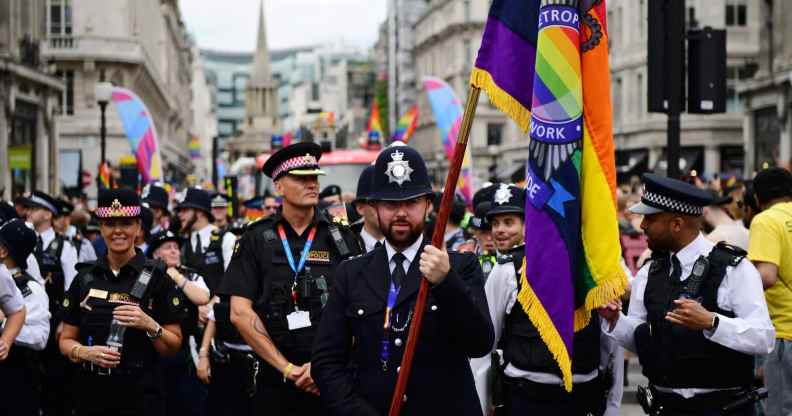LGBT+ police officers urge community to ‘trust the system’ to deal with hate crimes, as most go unreported

Members of the police march at Pride in London 2019. (Chris J Ratcliffe/Getty)
Members of the police march at Pride in London 2019. (Chris J Ratcliffe/Getty)
With four in five anti-LGBT+ hate crimes going unreported, three queer police officers are urging victims to trust the system and come forward with their experiences.
According to new Home Office figures, overall hate crime levels topped 100,000 for the first time last year, the highest number since records began. Homophobic offences jumped by a shocking 19 per cent and the biggest proportionate rise was seen in transgender hate crimes, which quadrupled between 2014-15 and 2019-20.
The result is that as many as one in five LGBT+ people (21 per cent) have been victim to a hate crime in the last 12 months – but the vast majority don’t report it to police. Younger people are particularly reluctant, with many feeling the police wouldn’t take them seriously if they did.
Nothing could be further from the truth, insist several LGBT+ police officers who have experienced the system from within.
“If people knew how we policed it, they’d understand how seriously we take it,” says Tara Addison, a bisexual officer whose previous role was responding to 999 calls.
“As soon as a hate crime is recorded, it gets a specialist unit to look at it as well as the officer. So you’ve got the officer investigating it, and then it has to be reviewed not just by a sergeant but by an inspector before it can be filed in any way.
“It’s reviewed, very, very thoroughly and very intensely by different people of different ranks.”
The officer receiving the call also has the option of making specific recommendations and will often contact the victim to offer follow-up support.
Tara admits there are many factors leading to a conviction, and in cases without evidence it can be hard to get the victim the justice they deserve – “[but] it won’t be because we haven’t investigated it thoroughly.”
Caspian Clunies-Ross, a gay trans constable, agrees that the police really do “want to get it right” – but he understands all too well why more people don’t report.
“You have to fight constantly as a trans person for your identity to be seen as valid,” he says. “You have to fight your way through changing your name and getting a gender recognition certificate and the right passport, and the process through the NHS. It’s a constant battle of saying, ‘This is my identity.’
“But the police shouldn’t add to that issue – and the ones I’ve seen aren’t doing that.”
Sadly, some officers are. Several hate crime victims told Stonewall they’d been persistently misgendered and deadnamed by police, warned that they had “provoked” the crime and advised to “be more resilient”.
“I talked, they listened, but it was their attitude and I got the impression that it was not being taken seriously,” said one. “I felt that I had suffered twice: once a physical attack and the second an attack by the state,” said another.
Experiences like these are why many forces around the country are hiring LGBT+ liaison advisors, giving people the option to speak to someone from their own community who understands their situation.
An increase in confidence could be part of the reason why more hate crimes are now being reported, suggests commander Clinton Blackburn, a gay officer with the City of London Police – but he accepts that more still needs to be done to build trust.
“It always saddens me when I hear that people are nervous about coming forward to police or feel there’s a lack of confidence,” he said.
“I’d be really surprised at [getting a] negative response from policing and if it’s a perception, just take a leap of faith, come forward and give us a try. Our people are highly trained and used to receiving complaints.
“Admittedly we will probably have some work to do in different areas of the country,” he continued. “But we are really keen that we do do that and build those bridges. We are absolutely passionate about getting it right with all communities.”

